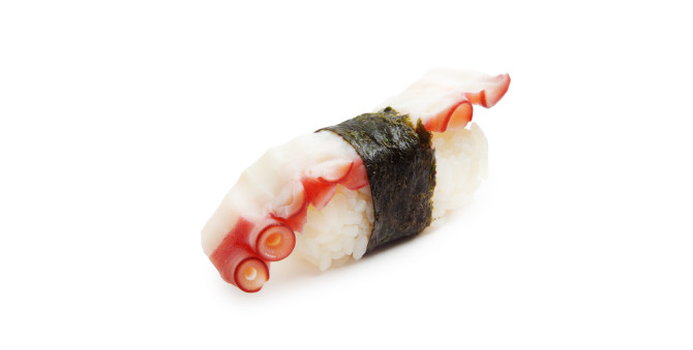Octopus is also known calamari, or if you live in the West Indies, it is called a Sea Cat! There are over 300 types of this oceanic cephalopod. Well known for its delicious tender texture, octopus is also a very nutritious food. It is a good - high source of 12 different vitamins and minerals! This means that in each 3 oz serving of octopus you are consuming more than 10% daily value (DV) of 12 essential nutrients that you need every day. It is a lean protein source, low in fat and contains as much protein as a similar 3 oz serving of chicken.
Nutritional Value of Octopus
3 oz of Octopus
Calories: 139
Proteins: 25g / 51% DV
Fats: 1.8g / 3% DV
Carbohydrates: 0g
Vitamin B12: 30.6mcg / 510% DV
Selenium: 76.2mcg / 109% DV
Iron: 8.1mg / 45% DV
Copper: 0.6mg / 31% DV
Vitamin B6: 0.6mg / 28% DV
Health Benefits of Octopus
- First of all, octopus packs a lot of nutrition into a single serving. In just one 3 oz portion, there is 510% DV for B12. This vitamin is responsible for making red blood cells and helping your body use fatty acids. This can be a hard nutrient for vegetarians and vegans to get enough of because it is a water soluble vitamin and you need to consume some every day.
- More than your DV for Selenium is also found in a single serving. Selenium is an important nutrient because it aids in cellular growth, boosts immune function and works with vitamin E as an antioxidant.
- Iron is also an important nutrient and a challenge for some to eat enough of. Luckily you can add octopus to your diet and in one serving you are consuming almost half of what you need for the day! Iron-rich foods help keep your immune system healthy and aids in brain development.
- Octopus is also a high source of copper. This trace mineral helps your body make hemoglobin and serves as a part of many enzymes.
- Vitamin B6 works by turning tryptophan, an amino acid, into niacin and serotonin, important for mental health. It also helps produce insulin, antibodies and hemoglobin.
- It also contains more than 1/4 of 1g of recommended omega-3 fatty acids that you should try to consume daily for heart health.

Emily DeLacey MS, RD is a Registered Dietitian and currently working in Jamaica as a HIV/ AIDS Prevention Specialist. She attended Central Washington University for her Bachelor's Degree in Science and Dietetics and continued on after her internship to Kent State University for her Master's Degree in Science and Nutrition, with a focus on public health and advocacy. She served as a U.S. Peace Corps Volunteer in Malawi 2012-2014 working as a Community Health Advisor in a rural village, immersing in the joys of life without electricity or running water. She has been to 20+ countries and 47 of the 50 states in the US. Traveling, adventuring and experiencing new cultures has made her a passionate advocate for the equality of nutrition and wellness for all people.



